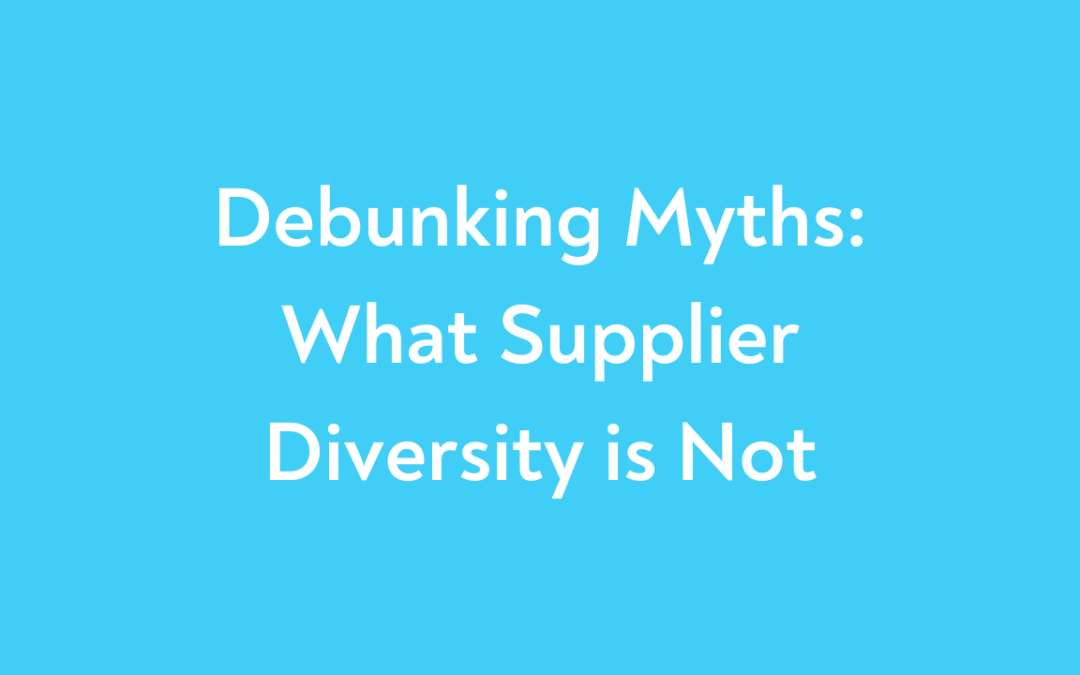Supplier diversity has rapidly evolved into a strategic business imperative that drives innovation, profitability, and social change. As more companies recognize the benefits of supplier diversity, it has also been subject to several misconceptions. These myths can muddy the understanding of what supplier diversity really is and hinder its implementation. In this article, we’ll debunk some common myths about supplier diversity and highlight what it truly represents—an engine of growth and inclusivity in the business world.
Myth 1: Supplier Diversity is Only About Compliance
Contrary to this belief, supplier diversity is not just a box to check for regulatory compliance or corporate social responsibility. It is a strategic approach that helps companies tap into new markets, foster innovation, and enhance competitiveness. Diverse suppliers often bring fresh perspectives, unique products, and necessary services that can significantly boost a company’s value proposition.
Myth 2: Supplier Diversity Compromises Quality
This myth feeds off a harmful stereotype—that small and diverse suppliers can’t match the quality of their majority counterparts. However, this is far from the truth. Diverse suppliers are selected based on the same rigorous criteria as any other supplier, including quality, reliability, and competitiveness. Many diverse suppliers have unique skill sets and the agility needed to meet the complex demands of large businesses.
Myth 3: Supplier Diversity is Only About Ethnic and Gender Diversity
While promoting racial and gender diversity is a crucial part of supplier diversity, it is not its sole focus. Supplier diversity is about inclusivity across the board, and this principle extends to businesses owned by veterans, disabled people, LGBTQIA+ individuals, and more. The mission is to provide equal opportunities to all underrepresented groups.
Myth 4: Supplier Diversity is Costly and Doesn’t Contribute to Profitability
Another common myth is that supplier diversity initiatives add extra costs and don’t significantly contribute to a company’s bottom line. However, several studies suggest otherwise. A report from the Hackett Group found that companies that focus on supplier diversity generate a 133% greater return on procurement investments than those that don’t. Diverse suppliers often offer more competitive pricing and flexible solutions, leading to cost savings. Furthermore, they can help companies enter new markets and attract diverse customers, boosting profitability.
Myth 5: Supplier Diversity is Only for Large Corporations
While it’s true that many large corporations have been leaders in supplier diversity, this initiative is equally beneficial and applicable for small and medium-sized enterprises (SMEs). SMEs can also reap the benefits of innovation, supply chain resilience, market expansion, and improved community relations through supplier diversity. Additionally, SMEs themselves can be diverse suppliers, contributing their unique value to larger corporations and benefiting from these relationships.
Myth 6: Supplier Diversity is a One-Time Effort
Supplier diversity is not just about including diverse suppliers in a company’s supply chain once. It requires ongoing commitment, regular evaluation, and constant efforts to build and strengthen relationships with diverse suppliers. It is about creating an environment where diverse suppliers can continuously grow and contribute to a company’s success.
Supplier diversity is a win-win endeavor that benefits companies, diverse suppliers, and local communities. By understanding what supplier diversity truly is and what it is not, we can collectively drive meaningful change and create a more inclusive, prosperous tomorrow.
Key Takeaways:
- Supplier Diversity is Not Just About Compliance: Far from being a mere checkbox for regulatory requirements, supplier diversity is a strategic business approach that fosters innovation and enhances competitiveness.
- Does Not Compromise Quality: Diverse suppliers meet the same rigorous criteria as any other supplier. Their unique skill sets and innovative solutions often ensure high-quality outputs.
- Goes Beyond Ethnic and Gender Diversity: While promoting racial and gender diversity is essential, supplier diversity also extends to businesses owned by veterans, disabled people, LGBTQIA+ individuals, and other underrepresented groups.
- Contributes to Profitability: Despite the myth that supplier diversity initiatives don’t contribute to a company’s bottom line, several studies suggest that these initiatives can lead to cost savings, market expansion, and increased profitability.
- Not Just for Large Corporations: Supplier diversity is beneficial for businesses of all sizes, including small and medium-sized enterprises. These companies can reap the benefits of innovation, market expansion, and improved community relations through supplier diversity.
- Requires Ongoing Commitment: Supplier diversity is not a one-time effort. It requires an ongoing commitment and continuous efforts to build and strengthen relationships with diverse suppliers.


Recent Comments